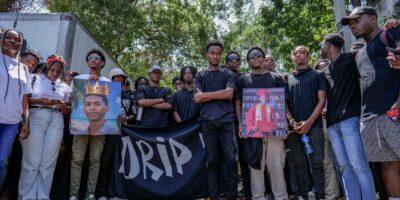If the aim of this agreement was to form a council reflective of the Haitian population, then it has unequivocally missed the mark
Haiti stands at the edge of an unprecedented crisis, tilting towards total collapse. The situation has been steadily worsening since 2018, characterized by rampant gang violence, extensive lockdowns, and the shocking assassination of the nation’s president in July 2021.
Dr. Ariel Henry, a neurosurgeon, assumed the country’s leadership as prime minister following the assassination, with promises of restoring stability, conducting elections, and reinstating democratic institutions.
However, he has struggled to achieve these.
Under his leadership, the security crisis has intensified, with gangs bold enough to free thousands of prisoners from the national penitentiary and besiege essential infrastructure in early March 2024.
Read also: Thousands of prisoners escape from Haiti’s national penitentiary
Henry, who had traveled to Kenya at that time to finalize a deal for an UN-approved multinational security mission, found himself unable to return to Haiti due to these significant threats.
With Dr. Ariel Henry compelled to remain outside Haiti, a solution emerged through international mediation spearheaded by CARICOM—Henry’s resignation and the establishment of a nine-member presidential council consisting of delegates from all the major political factions.
Traditionally, presidential councils featured independent figures from the military or civil society, offering a degree of neutrality. This council, however, will be filled with political party representatives who bear the responsibility of organizing elections in which their respective parties are set to participate. One can’t help but wonder about the possible complications ahead.
Haiti stands at the edge of an unprecedented crisis, tilting towards total collapse.
The presidential council will be tasked with a clear and crucial mandate: to reestablish security with the assistance of the multinational security mission and expedite the electoral process, guiding Haiti towards the restoration of democratic governance.
Read also: The Ruto-Henry agreement does not dispel the illegality of the deployment
This approach, despite its absence of constitutional endorsement, appears to be one of the few viable options available considering the extended period without constitutional governance and Dr. Ariel Henry’s failure to organize elections.
The creation of this council, despite concerns about its legitimacy, held the potential to be a beacon of hope if it had included independent voices from Haitian civil society and the diaspora—people truly committed to the nation’s resurgence. Such individuals could have served as a crucial link between the political machinery and the public’s desires, paving a more inclusive and effective route for Haiti’s reconstruction.
Unfortunately, the council, as endorsed by the international community, will be composed of representatives of members of the political elite, some of whom have contributed to Haiti’s downfall. It seems that, yet again, the real interests of the Haitian people are sidelined in favor of political convenience.
If the aim of this agreement was to form a council reflective of the Haitian population, then it has unequivocally missed the mark.
It seems that, yet again, the real interests of the Haitian people are sidelined in favor of political convenience.
It’s evident that the political elite does not embody the interests of the Haitian people, who have become deeply disenchanted with a political system that appears to disregard their needs and hopes. The exceptionally low voter turnout observed in the 2015 and 2016 general elections vividly illustrates this disenchantment.
Haitian political actors have consistently fallen short of gaining the public’s trust. Time and again, they have united not to foster constructive progress, but rather to tear down aggressively; not to build unity, but to seize control. The effectiveness of this council will be truly tested when the time comes to share power and administer governance for the welfare of all Haitians.
Read also: Perspective | Que peut Bukele contre les gangs en Haïti ?
Yet, I deeply hope for the success of this presidential council, hoping it signifies the start of Haiti’s extensive path towards a brighter future. However, my optimism is cautious, tempered by the harsh lessons of history and a profound distrust in Haiti’s present political leaders. For the well-being of Haiti and all its citizens, I hold on to the hope that this occasion will mark a departure from past disappointments.
By Boaz Anglade, Haitian development economist working as a consultant in international development. He is a founding member of the Jenès Konsyan (Conscious Youth) political party.
Cover image : From left to right: Antony Blinken (USA), Irfaan Ali (Guyana), and Andrew Holness (Jamaica) during the emergency meeting of CARICOM members in Jamaica on March 11, 2024. • ©COLLIN REID / AP
Stay in touch with AyiboPost through :
► Our WhatsApp channel : click here
► Our WhatsApp Community : click here
► Our Telegram canal : click here







Comments